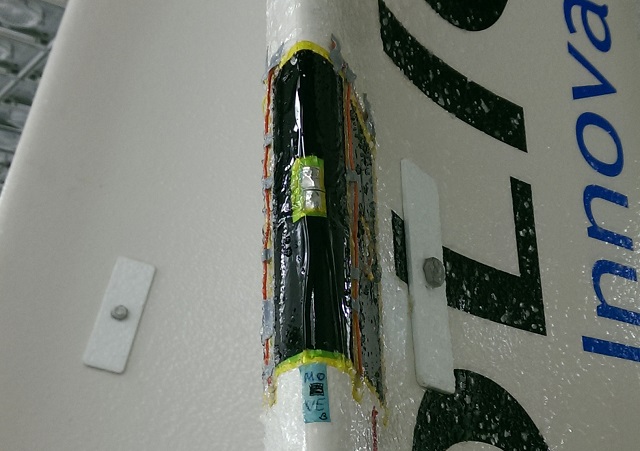 The area on the rotor blade heated by the CNTcoating remains free of ice. © Fraunhofer IPA
The area on the rotor blade heated by the CNTcoating remains free of ice. © Fraunhofer IPA
In collaboration with six corporations from four EU states, the Fraunhofer Institute for Manufacturing Engineering and Automation IPA has developed an energy-efficient, carbon nanotube coating-based, ice detection and anti-icing system for wind turbines. This work is part of the EU’s “Windheat Project.”
In cold climates, the wind is often very strong. However, it is not easy to harvest this energy using wind turbines due to the extreme conditions and formation of ice on rotor blades. When ice forms it reduces aerodynamic performance, energy produced by the turbine blades is lower, and the lifetime of the blade is severely affected.
Furthermore, breaking icicles poses a significant safety risk. Wind turbine systems are usually shut down whenever ice forms on them. This causes roughly 14-20% losses in power generation. Therefore the construction of wind turbines is not advised in cold regions.
Wind turbine systems in cold regions do have anti-icing systems, but they consume a great deal of energy as these systems are designed to heat up the entire blade. As part of the “Windheat” project, a different technique has been used. The collaborators divided rotor blades into different zones; each zone was finished with carbon nanotube (CNT) coating. A dedicated ice detector was added for each CNT layer.
These detectors measure both the humidity and temperature on the surface of the blade continuously. When they detect ice, the heating element for the corresponding layer switches on, and when the ice melts, the heat supply is switched off automatically. The “Windheat” project aims to boost the energy efficiency of wind turbines in cold regions by 18%.
Using computer simulations, the researchers discovered that the edges of the turbine blades were more prone to ice build-up. Wind tunnel tests of prototypes confirmed these findings. The prototypes were tested under various conditions at high wind speeds (120 km/h).
The researchers used low-cost materials to produce the heating elements and sensors, which will allow them to be mass-produced fairly easily. The team applied CNT coatings onto the rotor blade of a small wind turbine system for performing the initial testing and found that this model was suitable for scaling up and may also be used for retrofitting.